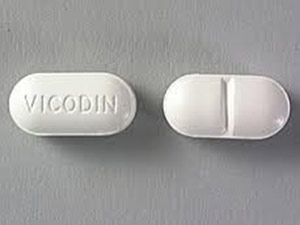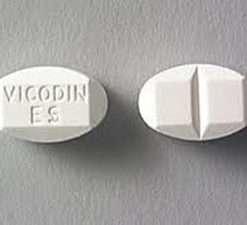What is Vicodin?
Vicodin is one of the common brand names under which the combination of Vicodin and paracetamol or Vicodin and acetaminophen is available. This medicinal combination got approved for medical use in the United States (U.S) in 1982. Being a scheduled drug, buying or selling Vicodin without a proper prescription is an offense under the law. You can purchase the medicine from a chemist shop near you, but the most convenient way to get the drug is to buy Vicodin online.
How to take Vicodin?
Your doctor will start your treatment with the minimum possible dose and gradually increase or decrease your dosage if required. To determine the best suitable dosages for you, your doctor should examine you properly. Your doctor will prescribe you Vicodin dosages keeping the following factors in mind:
- Age and weight of the patient
- The medical condition of the patient
- Other health disorders the patient is suffering from
- How does the patient respond to the first dose of the medicine?
Take Vicodin as prescribed by your doctor and take care of all the instructions and directions given on the prescription or medicine label. Please don’t use it more often than recommended and tell your doctor if you do not observe any improvement in your condition. It is best to avoid medical errors and try to be consistent throughout your treatment.
The following are the usual Vicodin dosage that your doctor can prescribe you:
Dosage for treating pain (moderate to severe)
In the form of VICODIN 5 mg/300 mg
- For adults
One to two Vicodin tablets after every four to six hours; your doctor will adjust your dose, but it should not exceed eight pills a day.
- For children
Doctors will determine the correct Vicodin dosage for children after a full and proper medical checkup.
In the form of VICODIN ES 7.5 mg/300 mg
- For adults
One to two Vicodin ES tablets after every four to six hours; your doctor will adjust your dose, but it should not six-eight pills a day.
- For children
Doctors will determine the correct Vicodin ES dosage for children after a full and proper medical checkup.
In the form of VICODIN HP 10 mg/300 mg
- For adults
One to two Vicodin HP tablets after every four to six hours; your doctor will adjust your dose, but it should not exceed six pills a day.
- For children
Doctors will determine the correct Vicodin HP dosage for children after a full and proper medical checkup.
Store Vicodin tablets appropriately at room temperature, away from heat, light, and moisture. Keep Vicodin tablets out of the reach of the children; they may misuse them. After completing your treatment, talk to pharmacists or chemists near you regarding the proper disposal of leftover medicine.
What to know before taking Vicodin?
You need to know the following points before using Vicodin:
- Take Vicodin only when your doctor prescribes it.
- Long-term use of Vicodin can create mental or physical dependence on the drug.
- Vicodin is a habit-forming medicine; misuse, abuse, and addiction of Vicodin can be life-threatening.
- Please avoid taking Vicodin if you are allergic to it or any of its components or similar medicines.
- Vicodin can cause you breathlessness; please don’t take it more often than prescribed.
- You cannot take Vicodin if you have taken any MAO inhibitors in the last two weeks or recently took sedatives, tranquilizers, or other narcotic medications.
- Your doctor may not prescribe you Vicodin if you have or ever had the following health disorder:
- Difficulty in breathing
- Sleep apnea (breathing that stops while sleeping)
- Damaged liver
- Gallbladder or pancreatic disorder
- Kidney disease
- Head injuries
- Seizures
- Urination problems
- Thyroid disorder
- Avoid Vicodin if you are addicted to any drugs or alcohol (or history thereof)
- Please don’t take Vicodin if you have asthma or other breathing disorders or blockage in the stomach or intestine.
- Breastfeeding might not be safe while using Vicodin.
- Using Vicodin during pregnancy can harm your child and may make your baby physically and mentally dependent on the drug.
- Please don’t start or stop using Vicodin out of sudden; otherwise, you may experience certain rebound or withdrawal symptoms.
- Visit your doctor frequently for regular medical checkups, and remember that using Vicodin is only a part of the treatment; follow your doctor’s advice to make medicine work more effectively.
- In case of Vicodin overdose, you can seek medical assistance by consulting your doctor or calling the poison helpline at 1-800-222-1222.
- It is best to tell the doctor about all the medicines and therapies you are currently taking.
- Avoid using herbal products, vitamins, over-the-counter medication, or other nutritional supplements while using Vicodin.
- If you want to order Vicodin online, do it via a legitimate online store.
- Ask your doctor about all the necessary precautions that you should take while using Vicodin.
- You can consult your doctor to learn more about the risks and benefits associated with the said medication.
What are the benefits of using Vicodin?
Being an opioid medication, Vicodin is an effective medication to provide relief against moderate to severe pain, including chronic and post-operative pain.
What are the side effects of Vicodin?
You can experience some of the following side effects after using Vicodin:
- Drowsiness
- Headache
- Upset stomach
- Constipation
- Blurred vision
- Dry mouth
You may have to face these mild side effects as they will be okay after a while. Still, suppose you feel these side effects are becoming worse day by day. In that case, please consult your doctor ASAP and seek medical help. Stop taking Vicodin and tell your doctor if you experience:
- Noisy breathing
- Sighing
- Slow or shallow breathing
- Sleep apnea (breathing that stops while sleeping)
- Lightheadedness
- Confusion
- Mood swings
- Behavior disorder
- Seizures or convulsions
- Easy bruising or bleeding
- Infertility (both in men and women)
- Irregular menstruation cycle
- Impotences
- Sexual disorder
- Problem in intimacy
- Damaged liver resulting in nausea or vomiting, pain in the upper stomach, itching, loss of appetite, dark-colored urine, jaundice, clay-colored urine
- Low cortisol level in the body resulting in loss of appetite, nausea or vomiting, tiredness, weakness, dizziness
- Symptoms of high serotonin levels in the body such as agitation, fever, hallucination, shivering, sweating, fast heart rate, diarrhea, nausea or vomiting, twitching in the muscles, loss of coordination.
- Any other severe allergic reaction to the medicine
How Vicodin works?
Vicodin works by binding to the mu-opioid receptor and acts on the central nervous system to provide relief against pain.
What to avoid while using Vicodin?
Taking Vicodin can impair your thinking and reactions. Please avoid driving and other activities requiring attention and alertness and consult your doctor before using cold, allergy, pain, or sleep medication. Avoid drinking alcohol while taking Vicodin.



Reviews
There are no reviews yet.